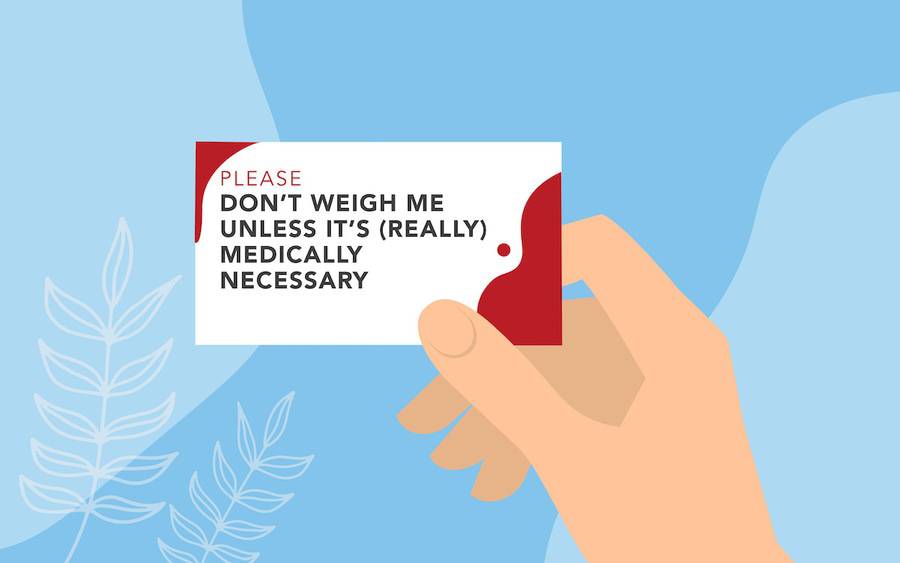Weighing In on 'Don’t Weigh Me' Cards
Should getting your weight taken at doctor’s office be optional?

Should getting your weight taken at doctor’s office be optional?
Stepping onto the scale has been a standard part of most medical appointments for decades. But if these routine weight checks make you uncomfortable, you’re not alone. Many people dislike having to weigh in, and a growing movement supports a tactful way to avoid it.
The size of a business card, “Don’t Weigh Me” cards were designed to use at your medical appointment if you would prefer not to be weighed.
The front of the card states, “Please don’t weigh me unless it’s (really) medically necessary” and asks for the medical reason for taking your weight. On the back are a list of reasons why the cardholder may not want to be weighed, including a claim that most health conditions can be addressed without knowing one’s weight and that focusing on weight is an unhealthy source of stress.
Why some consider being weighed an issue
The cards are the creation of Ginny Jones, whose website More-love.org aims to empower parents to raise “kids who are free from body hate and eating disorders.” She developed the cards for people who have or had eating disorders and disordered eating, feel they are discriminated against because of weight or simply don’t agree with being weighed before every appointment.
Jones believes that being weighed and talking about weight causes feelings of stress, anxiety and shame, and that some people may even forego seeing a doctor in order to avoid the scale.
Supporters of the “Don’t Weigh Me” movement believe that many medical conditions, such as a broken bone or a rash, have nothing to do with a patient’s weight. They say if weight information is required for care, the health care provider should explain the medical reason and obtain the patient’s informed consent to check it. Then, doctor and patient can discuss options for measuring weight and make a decision together.
They say patients should have options. Instead of stepping onto the scale in the office, for example, the patient could say their weight has significantly changed, or weigh themselves at home and share that information with the medical team.
They say the cards can help empower patients to take a more active role in their care and open the lines of communication with their doctors to have positive discussions about weight and body image.
Why physicians consider weight an important health metric
While most health care providers understand that weight can be a sensitive issue, many believe the cards can hinder a patient’s care. As a partner in health care with patients, physicians want to use all the measurements and tools available to make the best diagnoses and treatment plans.
“Weight measurement is an important health assessment tool,” says Saima Lodhi, MD, an internal medicine physician with Scripps Coastal Medical Center Hillcrest. “Checking weight allows us to capture unexpected or unintended weight fluctuations that can prompt screening into more serious medical concerns or adjustments to medication doses.”
“As clinicians, we need the weight to accurately address BMI and, subsequently, health-related issues. Increasing or high weight may prompt screening for related conditions, such as fatty liver, sleep apnea and diabetes,” says Siu Ming Geary, MD, an internal medicine physician with Scripps Clinic Rancho Bernardo.
While Dr. Geary appreciates the “only if absolutely necessary” component, she would prefer to talk with patients about why weight is an important factor in their health and address it in a considerate, sensitive, and private manner. “Of course, if they bring in this card, our staff will explain why we need their weight. If they still decline, they can see the physician first and go from there. We never force a patient to do something they don’t want to do.”
“If a patient declines to be weighed due to concerns about fat-shaming or body image, it signals to me that I may want to screen the patient for potential issues, such as depression, body dysmorphia or other issues that might be negatively impacting the patient’s physical and mental health,” Dr. Geary adds. “These conditions are treatable, but we can only address them if we have an opportunity to diagnose them.”
Regardless of how you feel about being weighed (or anything else related to your care), it’s important to be involved in your care and let your provider and care team know if you have questions or concerns.